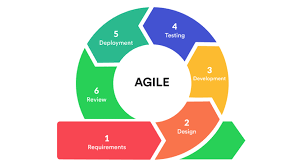Unlocking Success: The Power of Agile Development in Modern Software Engineering
The Benefits of Agile Development in Software Engineering
Agile development has revolutionized the way software is created and delivered in the modern world. This iterative approach to software development emphasizes flexibility, collaboration, and customer feedback throughout the development process.
Flexibility and Adaptability
One of the key benefits of agile development is its emphasis on flexibility. Agile methodologies allow for changes to be made quickly and easily, enabling teams to adapt to evolving requirements and market conditions. This flexibility helps teams respond effectively to feedback and deliver high-quality software that meets customer needs.
Collaboration and Communication
Agile development promotes collaboration among team members, stakeholders, and customers. By working closely together throughout the development process, teams can ensure that everyone is aligned on project goals and priorities. Regular communication helps identify issues early on and facilitates problem-solving in a timely manner.
Rapid Delivery of Value
Agile methodologies prioritize the delivery of working software in short iterations known as sprints. This incremental approach allows teams to deliver value to customers quickly and frequently. By breaking down projects into smaller tasks, teams can focus on delivering features that provide tangible benefits to users.
Continuous Improvement
Agile development encourages a culture of continuous improvement. Through regular retrospectives and feedback loops, teams reflect on their processes and identify areas for enhancement. By learning from past experiences and making adjustments as needed, teams can increase productivity, efficiency, and overall quality.
Conclusion
In conclusion, agile development offers numerous benefits that can help software engineering teams deliver high-quality software efficiently and effectively. By embracing flexibility, collaboration, rapid delivery, and continuous improvement, organizations can stay competitive in today’s fast-paced digital landscape.
6 Key Advantages of Agile Development: Flexibility, Collaboration, and Customer Satisfaction
- Flexibility to adapt to changing requirements
- Enhanced collaboration among team members
- Faster delivery of working software
- Increased customer satisfaction through frequent feedback
- Emphasis on continuous improvement and learning
- Better risk management and transparency in the development process
Challenges of Agile Development: Navigating Uncertainty, Feedback Dependence, and Collaboration Hurdles
- Uncertainty in project scope and timelines due to the iterative nature of agile development.
- Over-reliance on customer feedback may lead to frequent changes that disrupt workflow and increase project complexity.
- Requires a high level of collaboration and communication, which can be challenging for distributed or remote teams.
Flexibility to adapt to changing requirements
One of the key advantages of agile development is its inherent flexibility to adapt to changing requirements. In traditional software development methodologies, rigid plans and specifications can hinder progress when requirements evolve. However, agile approaches allow teams to easily accommodate changes throughout the development process. By embracing this flexibility, agile teams can quickly adjust their priorities and deliver software that meets the evolving needs of customers and stakeholders in a timely manner.
Enhanced collaboration among team members
Enhanced collaboration among team members is a significant advantage of agile development. By fostering a culture of teamwork and open communication, agile methodologies encourage active participation and shared responsibility within the team. Team members work closely together, leveraging their diverse skills and perspectives to solve problems, make decisions, and deliver high-quality software efficiently. This collaborative approach not only improves overall team morale but also leads to better outcomes as everyone is aligned on project goals and actively contributes to the success of the project.
Faster delivery of working software
One of the key advantages of agile development is its ability to facilitate the faster delivery of working software. By breaking down projects into manageable iterations and focusing on delivering functional features in short sprints, agile teams can provide tangible value to customers more rapidly. This approach not only accelerates the development process but also allows for early feedback from stakeholders, enabling teams to make necessary adjustments and ensure that the final product meets customer expectations in a timely manner.
Increased customer satisfaction through frequent feedback
One of the key advantages of agile development is the increased customer satisfaction achieved through frequent feedback. By involving customers in the development process and regularly gathering their input, agile teams can ensure that the final product meets their needs and expectations. This iterative approach allows for adjustments to be made based on real-time feedback, resulting in a product that aligns more closely with customer requirements. Ultimately, by prioritizing customer satisfaction and responsiveness to their feedback, agile development fosters stronger relationships with clients and enhances overall project success.
Emphasis on continuous improvement and learning
One significant advantage of agile development is its emphasis on continuous improvement and learning. By fostering a culture that values reflection, feedback, and adaptation, agile teams are constantly striving to enhance their processes and deliver better results. This focus on continuous learning not only leads to improved productivity and efficiency but also empowers team members to grow their skills and expertise, ultimately contributing to the overall success of the project.
Better risk management and transparency in the development process
One of the significant advantages of agile development is its ability to provide better risk management and transparency throughout the development process. By breaking down projects into smaller, manageable iterations, teams can identify and address potential risks early on. This iterative approach allows for continuous monitoring and adjustment, leading to improved visibility into project progress and potential challenges. Stakeholders can stay informed about the project’s status, making it easier to manage expectations and make informed decisions based on real-time information. Ultimately, this proactive risk management approach enhances transparency, fosters collaboration, and increases the likelihood of project success.
Uncertainty in project scope and timelines due to the iterative nature of agile development.
In agile development, one significant challenge is the uncertainty surrounding project scope and timelines. The iterative nature of agile methodologies allows for flexibility and adaptability, but it can also introduce ambiguity regarding the final deliverables and completion dates. As requirements evolve and new features are added or modified throughout the development process, stakeholders may find it challenging to predict project milestones accurately. This uncertainty can lead to difficulties in project planning and resource allocation, potentially affecting overall project success and stakeholder satisfaction.
Over-reliance on customer feedback may lead to frequent changes that disrupt workflow and increase project complexity.
An inherent drawback of agile development is the risk of over-reliance on customer feedback, which can potentially result in frequent changes that disrupt the workflow and escalate project complexity. While customer input is valuable for ensuring that software meets user needs, excessive alterations throughout the development process can introduce inefficiencies, delays, and challenges in maintaining project momentum. Striking a balance between accommodating feedback and adhering to project timelines is crucial to prevent unnecessary disruptions and maintain a streamlined development process.
Requires a high level of collaboration and communication, which can be challenging for distributed or remote teams.
One significant challenge of agile development is the high level of collaboration and communication it requires, which can be particularly difficult for distributed or remote teams. In such environments, team members may face obstacles in maintaining clear and consistent communication due to physical distance and time zone differences. This can lead to delays in decision-making, misunderstandings, and a lack of cohesion among team members, ultimately impacting the efficiency and effectiveness of the development process. Finding ways to overcome these communication barriers is essential for distributed or remote teams to successfully implement agile methodologies and achieve project goals.




